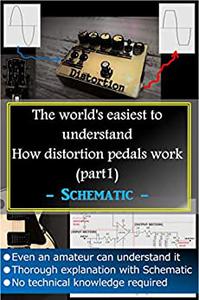
Free Download The world's easiest to understand How distortion pedals work (part1): Explanation of Electronic Schematics by lenheyan
English | 2022 | ISBN: N/A | ASIN: B0BH3FFRY9 | 198 pages | EPUB | 1.10 Mb
In "The World's Easiest to Understand Distortion Effectors (Part 1) - Explanation of Electronic Circuits", we will explain the electronic circuits of distortion effectors in this book.
In "The World's Easiest-to-Understand Strain Effectors (Part 2) - Explanation of Wiring Layout", we will explain the wiring layout, assuming you have the knowledge of this book, so please read Part 1 and Part 2 in this order.
This book is for guitarists who "don't really understand how effectors work, but want to create their own best distortion sound.
However, we will not talk about anything more difficult than necessary.
This is because the goal is to understand how distortion effector circuits work, and to be able to create something equivalent yourself.
We will carefully explain the structure of an effector circuit, starting with the INPUT section, in order, so that you can understand the meaning of what each part does.
How does amplification work in an operational amplifier?
Bias voltage?
How does it distort the sound?
How is filtering high frequencies achieved?
What is ground anyway?
How do you turn LEDs on and off?
etc...
If you try to do these things from scratch while researching on the Internet, you will fail before you even get started.
This book is for those people!
In this book, the circuits are explained in detail, explaining the role of each part one by one.
When I started to make my own effectors, there were no books that explained the meaning of each part of the circuit (resistors, capacitors, etc.), how to use switches and other parts, and even how to wire the circuit in an easy-to-understand manner for the layman.
Therefore, I learned by researching one by one on the Internet, but it took me a long time to understand the principle of operation and to be able to make my own effectors.
So I decided to document the knowledge I had gained so far.
I know that many of you are creating distortion sounds with distortion effectors and amps, but have you found a sound that you are satisfied with?
It often happens that you have an effect pedal that you love, but you can't quite scratch that itch, such as "I wish it had a little more solid bass," or "I wish it had more amp-like dynamics.
It is difficult to solve these complaints with off-the-shelf effect pedals.
The reason is that your favorite effects pedal is the one you use because you like its sound, and changing to another effects pedal will make it something else.
What you want to do is to keep the sound of your favorite effects pedal and adjust the sound slightly.
The quickest way to do this is to ask a workshop that offers such a service, but it is difficult to be 100% satisfied if you want to thoroughly pursue your ideal sound.
It also costs a lot of money and you will be very disappointed if you are not satisfied with it.
This is because it is very difficult to accurately convey one's image to others.
This fun world is right around the corner from you.
Until now, I thought that effectors were made by people with expertise because such information was not available nearby, but recently the number of people making their own effectors has been increasing.
I think this is because people who make their own effectors transmit information on the Internet, people who see them become interested in them, and people who are fascinated by the fun of making effectors start transmitting information again.
I am one such person.
However, as mentioned above, I feel that the threshold is still high, which is why I am writing this book.
By lowering the threshold to the world of self-made effectors through this book, I hope to create a fun world where guitarists can create their ideal sounds while modifying and making their own effectors as a matter of course.
